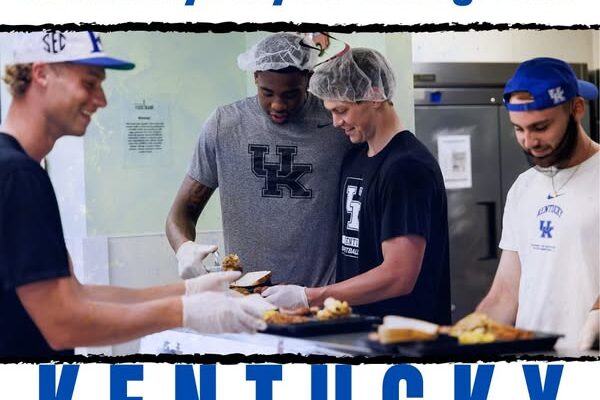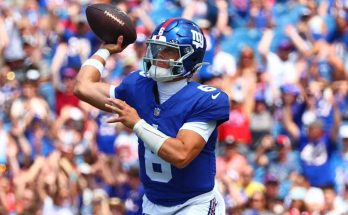The Kentucky basketball team was recently seen volunteering at the Hope Center, where they helped serve meals to those in need. It’s inspiring to see these young athletes take time out of their schedules to give back and make a positive impact in their community.
The Kentucky basketball team, known for its rich tradition, passionate fanbase, and consistent dominance on the court, recently took a break from their rigorous summer workouts and practice sessions to do something far more meaningful than hitting jump shots or running drills. Instead of lacing up their sneakers for a game, these young men put on aprons and gloves to serve meals at the Hope Center—a local nonprofit in Lexington dedicated to helping individuals experiencing homelessness, addiction, and other life challenges. Their visit wasn’t just a brief photo opportunity or a chance to rack up community service hours; it was a genuine, heartfelt gesture of solidarity and compassion that reflected the character and values instilled not just by the coaching staff, but by the University of Kentucky athletic program as a whole.
In an era when college athletics often grab headlines for controversial transfers, NIL debates, or intense recruiting battles, moments like this remind everyone that there’s a much deeper, more human element to being a student-athlete. These young men, many of whom come from different backgrounds and have faced personal struggles of their own, stepped off the court to be present for those who are often overlooked. And it wasn’t just a symbolic act. From prepping meals in the kitchen to handing out plates and engaging with the guests at the Hope Center, the players were fully immersed in the experience. They were there to serve—not just food, but dignity, warmth, and a sense of connection.
For many at the Hope Center, daily life involves uncertainty. Meals, shelter, and safety aren’t guaranteed. So, when a group of tall, high-profile athletes—some of whom might very well be future NBA stars—show up with humility and willingness to help, it doesn’t go unnoticed. The guests responded with smiles, laughter, and in some cases, quiet surprise. These weren’t just basketball players. They were people showing up with open hearts and no agenda other than to help.
Players like returning guard D.J. Wagner, incoming recruits, and veteran leaders on the team didn’t approach the day like celebrities or local heroes. They were teammates in the kitchen, focused on making sure everyone got fed. They rotated tasks with the kitchen staff and Hope Center volunteers—some plating food, others pouring drinks, and several stepping out to greet and chat with guests at the tables. Conversations ranged from sports to family to life stories. There were no cameras chasing them through every interaction. This was community, plain and simple.
Head coach John Calipari has long emphasized the importance of shaping not just elite athletes but complete individuals. His “players first” philosophy often goes hand-in-hand with accountability, discipline, and the understanding that being a Kentucky Wildcat is about more than basketball stats or highlight reels. Community involvement has always been a part of that equation. This visit to the Hope Center was just one example of the way Calipari and his program walk that talk.
Beyond the court, many of these players are still teenagers or young adults learning who they are and what they stand for. Opportunities like this allow them to expand their worldview, develop empathy, and recognize the platform they hold. One player, when asked what the day meant to him, said it gave him a new appreciation for the small things—like a warm meal, a safe place to sleep, and someone to talk to. That level of self-awareness doesn’t always come naturally in college, especially for athletes constantly under pressure to perform. But moments like these offer a chance to reflect.
The Hope Center itself has served as a beacon for Lexington’s most vulnerable populations for decades. With programs focused on recovery, employment, transitional housing, and health services, it has become more than just a shelter. It’s a launchpad for transformation. Staff and volunteers work tirelessly every day to meet not just the physical needs of their guests, but also the emotional and psychological ones. The partnership with UK athletics has been a consistent source of positivity and visibility for their mission.
When prominent figures from the community—especially ones that represent hope and aspiration, like the Kentucky basketball team—choose to spend time at the Hope Center, it sends a message. It says that everyone matters. That no one is forgotten. And that change, no matter how gradual, begins with connection and compassion.
Fans who follow the team closely often see the highlight dunks, buzzer-beaters, and packed Rupp Arena crowds. What they may not see as often is the character being built off the court—moments where young men are asked to step into leadership roles beyond basketball, to be present where it matters, to understand the impact they can have simply by showing up and caring.
For the coaching staff and the athletic department, these moments also serve as a reminder of the real-world impact that comes with managing a high-profile college program. Wins and losses define a season, but legacy is shaped by what you give back. And this generation of Wildcats seems to understand that deeply.
Some of the volunteers at the Hope Center commented afterward on how polite, respectful, and engaged the players were. One longtime staffer said it was one of the most down-to-earth groups of young men she’d ever seen come through. That speaks volumes about the culture around this team. It’s not always easy to maintain humility when you’re part of a program that garners national attention, sells out arenas, and is regularly in the spotlight. Yet this group didn’t carry themselves like stars. They carried themselves like neighbors.
As the new season approaches and media coverage ramps up, there will be discussions about rotations, preseason rankings, draft projections, and March Madness potential. But perhaps just as important are the quiet days like this—away from the cameras, rooted in service, grounded in empathy. These are the moments that shape young players into men. That remind a community it is loved. That reflect the true spirit of sports.
This visit won’t show up on any stat sheet. There won’t be a trophy handed out for compassion. But for the people at the Hope Center who received a warm meal, a conversation, and the kindness of young men who cared enough to serve—it mattered. It mattered deeply.
And for the Kentucky basketball team, it was another kind of win—one that counts more than any score on the court. It was a reminder that greatness isn’t just measured in banners or championships, but in heart, humanity, and a willingness to uplift others.
So as fans continue to cheer for these Wildcats during the upcoming season, they can also take pride in knowing their team represents something far beyond basketball. They represent leadership. They represent compassion. They represent what it means to truly give back.


